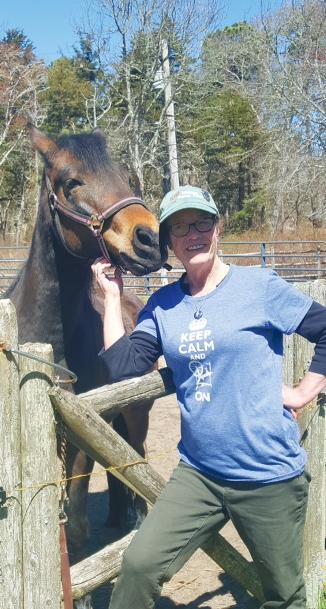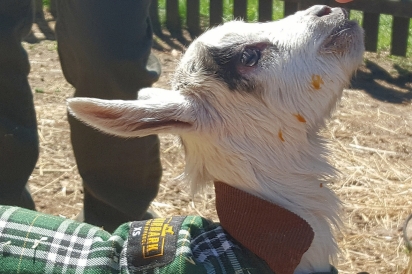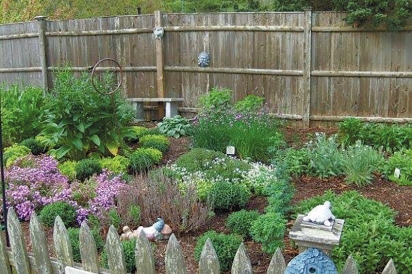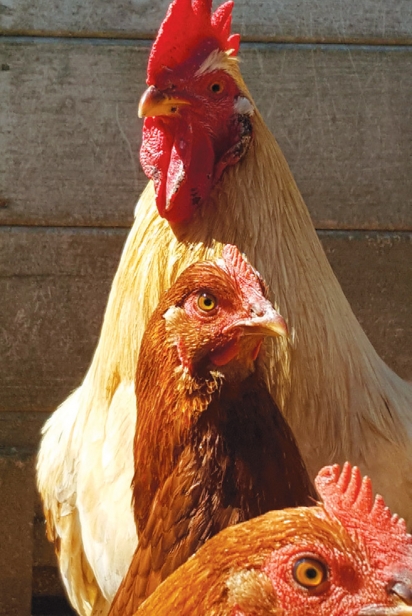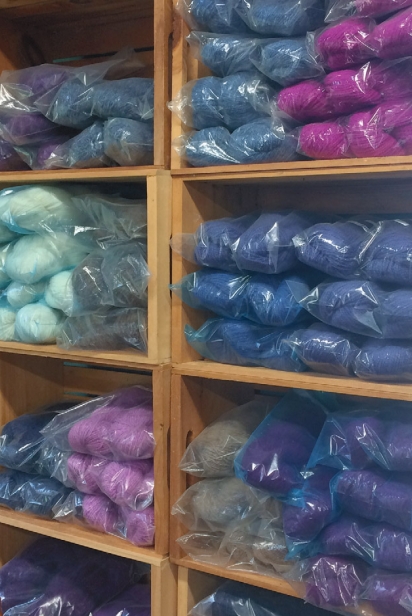Hidden Acres Farm
While Jan Rollins may live in the modern world, her heart is firmly entrenched in the past. The former fence company owner describes farming as a strong call back to the old ways, and when she isn’t reenacting history as a hobby, she is happily cultivating her two-acre spread on Upper County Road in Dennis. Among the animals and gardens, life on Hidden Acres Farm takes on a slower pace. The days are marked seasonally by the spinning wheel, animal births, planting, harvest and shearing time.
Originally from Springfield in Western Massachusetts, Rollins ran a fence company for 32 years on the same site as the current farm. During that time she always had some sheep, goats, chickens and horses, but five years ago she closed the fence company to embrace farming full time. In addition to the farm stand she runs onsite, she can be found on Thursdays from June to October at the Harwich Farmers’ Market. Her mission is clear: provide people with fresh local produce and farm-related products while educating them about general farming and where their food comes from.
“I wanted to farm since I came out of the womb. I don’t come from farmers, but I always had a fascination with animals, and I just felt like I was called. I was interested in the old ways of doing things, and in second grade we went on a field trip to a dairy farm. I was the only one who wanted to milk the cow by hand. It was exciting. I just loved that sort of stuff, and I’ve always been attracted to it,” she said.
Rollins has also worked as the treasurer of the Cape and Islands Farm Bureau for four years. “The Cape is tough to farm, with land so expensive it’s hard to have five acres to put up a farm. It’s not like Western Mass. Most Cape farmers are cranberry growers because that acreage is not buildable and therefore cheap. Years ago to be a farmer you needed to have five or more acres, but the law changed in the last few years to two or more acres, so I just make the cutoff,” she said.
The first thing you see on Hidden Acres Farm is the farm stand, which is open to the public. If you stop in and see the black Explorer out front, Rollins is in. If not, you will find a chalkboard advising where she is on the farm and asking you to call her. The farm stand is full of brightly colored wool from her sheep, and you can see her spinning wheel. You can buy produce, wool, soap made from goats milk, and salves Rollins makes by hand from her herb garden, as well as raw goats milk, which is only available on the farm due to health regulations.
The second thing you see on the farm is the animals. Rollins says spinning wool is a winter activity, while spring is clearly more about animals and soil. At the time of my visit this spring there were 16 baby Khaki Campbell ducks at Hidden Acres. “I decided to raise them, as a lot of customers want duck eggs. Supposedly they’re better for you than chicken eggs,” Rollins said. There is an added bonus as well. Duck manure does not have to cure as chicken manure does, and it can be used right away.
Rollins says she’s always been drawn to the eighteenth century, and doing things the old way, spinning, dipping candles and farming. “The year after 9/11, I saw an ad in the paper that the Yarmouth Minute Men were going to do an encampment in Harwich. I’d been spinning the wheel for 10 years, so I went there and everyone was all dressed up with tents for an eighteenth-century weekend. I asked the unit captain if he wanted a spinner and he loved it,” she said. Now Rollins and her husband are both historical reenactors, and Rollins has served as captain of a unit for three years. “I can fire a cannon and a musket,” she said.
On the farm, a brown neutered registered Alpine goat named Leroy looks content in the morning sun. Keeping him company is Archibald, a white stud buck of the same breed. “They’re from Western Mass and they’re friends. Goats are herding animals, you need more than one,” Rollins explained. There is exciting news among the milk goats. Chrystal, also an Alpine, has recently given birth to two males and one female. It’s a bit chilly, so the goat kids are wearing little jackets as they frolic in the sunshine in their own pen. “I take the goats from the mother 24 hours after they first nurse to get colostrum. Then I hand feed them as they wean. At six weeks I sell them to another farm,” Rollins said. This is the basic outline of how milk is produced on a farm. The goats breed annually, and currently, all the female goats on the farm except Crystal are pregnant. In addition to selling the raw milk, Rollins uses it as an ingredient in her homemade goat milk soap.
A beautiful flock of 45 Golden Comet chickens is pecking at grain. A cross between a Rhode Island Red and a Leg Horn, the flock sports one rooster. “They are friendly, great layers of big brown eggs,” Rollins said. Another coop holds a flock of Barrel Rock chickens, a dual-purpose bird that lays eggs and is also big enough for the pot. Barrel Rocks are a heritage breed dating to the 1700s. “I keep them for about a year, and dress them off for meat when they’ve slacked off the eggs,” Rollins explained. Today there are seven left of this spring’s original 25 because a weasel managed to get into the coop and kill 13 chickens. “Weasels bite the necks, drink the blood, and leave the bodies. We had new shavings on the floor, and no blood showing. We thought it was raccoons, but the next morning four more were dead, and it turned out it was a weasel coming up through the floorboards. I put down one-inch floorboards, and that was the end of weasel, but he killed 17 of 25. They were two months old. It was heart-wrenching,” Rollins said.
The old ways of local farming can point us to a more sustainable future, but Rollins says the hardest thing is getting people into the habit of coming to a farm for food. “People are so habitual, it’s hard to get them to shift the habit of grocery shopping to farm shopping. A lot of kids don’t know where their food comes from. I asked a child once where does food come from. He said the grocery store. I asked where that food came from, and he said a bigger store. I asked where that food came and he said he didn’t know. Linking farm to table is the top priority. You can walk to my farm and pick a tomato. Think about the carbon footprint. Walk here, pick it, and eat it. Or you can go to the grocery store and buy a tomato grown in Brazil, picked before it is ripe, and traveled and delivered by tractor-trailer to the market. Look at that carbon footprint,” she said.
A series of pens houses several incredibly fluffy rabbits. One, called Lucky, is a velvety black rabbit three years old. By breed, he is a Rex, and he was named by Rollins’s grandson. “I’m going to start doing meat rabbits,” Rollins said, introducing us to Mary, a New Zealand White rabbit, set to breed with Noah, a huge 15-pound Flemish Giant. When you see him you think you’ve found the Easter bunny. Check in with Rollins this fall if you’re interested in rabbit meat.
Overseeing the back 40 is a friendly 12-year-old horse named Tansy. Technically, Tansy is a cross between an Appaloosa and a New Vinland Pony, and she has an interesting story. “She’s from an endangered breed. They were slaughtered from 7000 to only 200. They’re hardy Newfoundlanders who could eat the tundra and not require food, and they were used in the coal mines, for kelp gathering, carriage pulling and plowing. With industrialization, there was no longer a need for them, so people let them go. Then they became a problem, and the government said to put up fences to control them, and since there was no money to put up fences, they were brought to slaughter. Now there are about 400 of them. There is a sanctuary for them in New Hampshire, and that’s where I got Tansy. She’s very level headed,” Rollins said as Tansy insinuated her nose for rubbing.
A magnificent horned Shetland sheep named Fenway suns himself in the doorway of the sheep enclosure. There are eight sheep at Hidden Acres providing beautiful wool. The flock is dotted around the sheep enclosure in various positions. Some are standing in the sun and some are resting in the shade. Their wool will ultimately fill the shelves of the farm stand in colorful rows, making it a prime destination for knitters.
In addition to her animals, Rollins grows an assortment of herbs and produce. She typically starts spring seeds, such as carrots, radishes, spinach and lettuce in her greenhouse, which reaches up to 100 degrees on a spring day and drops to 40 or 50 degrees in the evening. “I wait until it warms up to put plants outside. When it warms up everything goes faster. It needs to be at least 70 degrees to have seeds germinate and grow,” she said. Her front garden plot is 32 x 48 feet and produces tomatoes, basil, zucchini, summer squash and eggplant. You can find these offerings at the farm stand in season with fruit from the perennial garden, including blueberries and raspberries.
Near the greenhouse is a 24 x 40 herb garden full of culinary and medicinal herbs: spearmint, peppermint, lavender, chives, tansy, sorrel and comfrey to aid both cooking and healing. “I sell Mojito mint to Sundancer’s during the season, they go through a lot,” she said. Rollins’s affinity with the past really shows in her herb work. “Comfrey was known as bone knit in the eighteenth century. It would knit your bone back together as a poultice made from the root with water applied to the wound. I hurt my ankle, so I tried comfrey by applying the poultice I made and wrapping it in Saran wrap and an ace bandage. The next morning I removed the bandage and I was cured,” she said. You can buy Rollins’s comfrey in several forms at the farm stand. “I grind the root and sell the powder, and I make comfrey salve from the leaves. I make goat’s milk soap and add comfrey, which is good to use on hurt muscles. It fixed a friend’s shoulder muscle, but it is important to remember to use comfrey as a topical cure only. It cannot be taken internally,” she said.
As the days shorten and the season winds down on Cape Cod, fall is a great time to visit Hidden Acres Farm. Following the ancient circle of the year, the harvest comes in and spring’s promise is realized in mature crops and animals. Rollins clearly loves sharing this with people, and she especially loves to include her 8-year-old grandson in farm chores, making the link from past to present to future clear. “In a world of fast food and computer games, people need to step back and go back to the simple ways. It’s healthier, and it gets kids outside helping grow food instead of playing their PlayStation. I’ve always wanted to farm full time, and now I’m living my dream,” she said.
Hidden Acres Farm
120 Upper County Road, Dennis Port
on Facebook
Farmstand open year round.
Products: Fresh produce in season, wool roving and 100% wool yarn, fresh and dried herbs, fresh and dried flowers, lip balms, goat’s milk soap, lavender sachets, catnip toys, fresh eggs.


